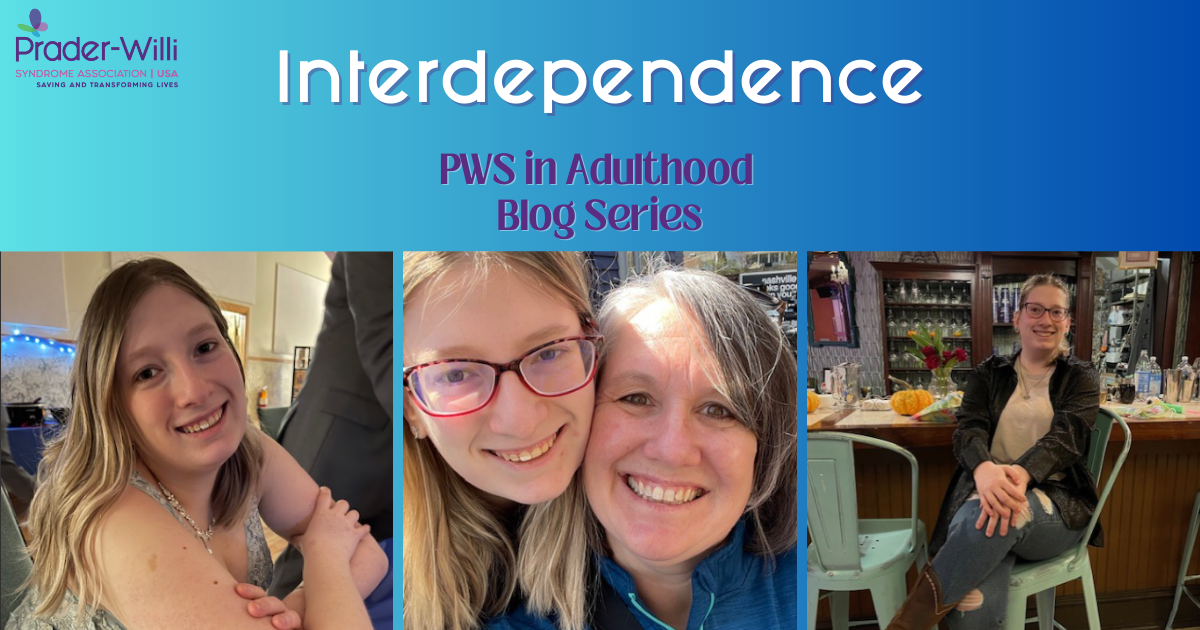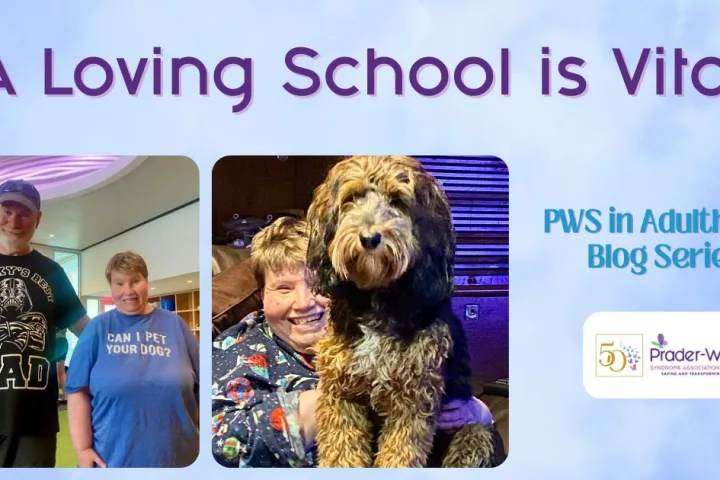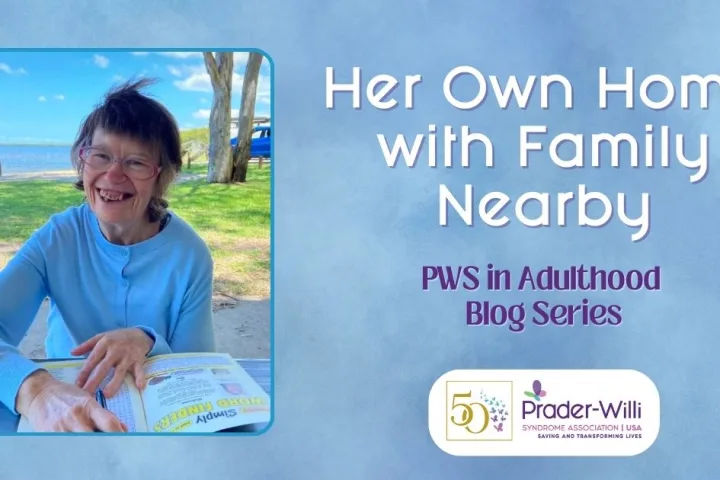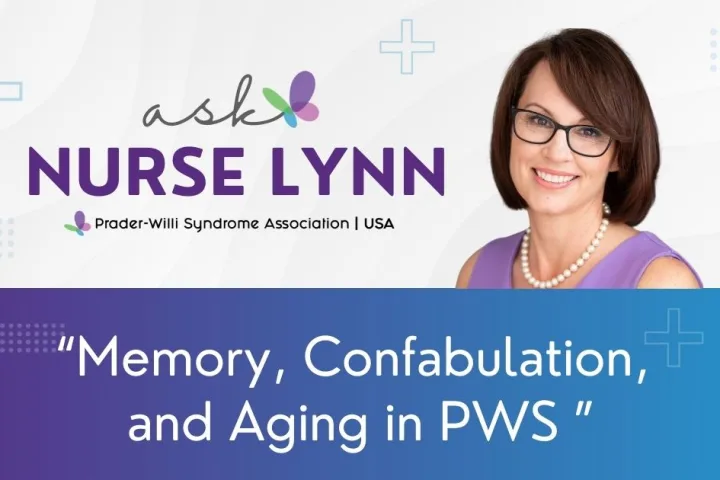contributed by Amy McDougall (mom to Noelle, 21)
Our daughter has always been an independent spirit: bright, organized, willing to advocate for herself, and preferring to decide between choices. However, she also struggles greatly with hyperphagia, which can completely “short-circuit” her logical problem-solving skills. We certainly dreamed of a future in which a medication would be available to treat the unrelenting hunger and where she could be fully independent. We also had significant concerns about the toll on her mental health and our family relationships should we have her grow up believing that she could be fully on her own, then need to put restrictions in place as she got older. From a young age, we chose to work toward “interdependence”, which we define as having the individual with PWS actively participate in making informed decisions about their future; however, being reliant on relational interactions with a guardian for ultimate decision-making responsibility. This way of thinking allowed us to have open discussions with our daughter about her needs while also acknowledging that she had her own thoughts, feelings, and opinions. These discussions helped her learn to speak up for herself and advocate appropriately. There were certainly difficult discussions when she wanted to do the things that her typical peers were doing; however, we had built trust over the years, and (after some tears and processing) she was able to acknowledge that our goal was to keep her safe, even if she might not like the decision.
Our daughter currently lives with us and prefers to do so. She is involved in volunteering in our community with the support of a community habilitation worker (sorting donations for a local shelter and serving as a teaching assistant at a local homeschool coop and school). She would like to attend some college classes in the future, should we be able to coordinate with her community hab worker to accompany her. Through these activities, she continues to build the skills that would help her to eventually be fully independent should treatment for hyperphagia ever become available. In the meantime, she feels secure with the structures and supports that are in place to keep her safe and loves knowing that she has a voice in our family dynamic.
Share this!





 Jennifer Bolander has been serving as a Special Education Specialist for PWSA (USA) since October of 2015. She is a graduate of John Carroll University and lives in Ohio with her husband Brad and daughters Kate (17), and Sophia (13) who was born with PWS.
Jennifer Bolander has been serving as a Special Education Specialist for PWSA (USA) since October of 2015. She is a graduate of John Carroll University and lives in Ohio with her husband Brad and daughters Kate (17), and Sophia (13) who was born with PWS. Perry A. Zirkel has written more than 1,500 publications on various aspects of school law, with an emphasis on legal issues in special education. He writes a regular column for NAESP’s Principal magazine and NASP’s Communiqué newsletter, and he did so previously for Phi Delta Kappan and Teaching Exceptional Children.
Perry A. Zirkel has written more than 1,500 publications on various aspects of school law, with an emphasis on legal issues in special education. He writes a regular column for NAESP’s Principal magazine and NASP’s Communiqué newsletter, and he did so previously for Phi Delta Kappan and Teaching Exceptional Children. Evan has worked with the Prader-Willi Syndrome Association (USA) since 2007 primarily as a Crisis Intervention and Family Support Counselor. Evans works with parents and schools to foster strong collaborative relationships and appropriate educational environments for students with PWS.
Evan has worked with the Prader-Willi Syndrome Association (USA) since 2007 primarily as a Crisis Intervention and Family Support Counselor. Evans works with parents and schools to foster strong collaborative relationships and appropriate educational environments for students with PWS. Dr. Amy McTighe is the PWS Program Manager and Inpatient Teacher at the Center for Prader-Willi Syndrome at the Children’s Institute of Pittsburgh. She graduated from Duquesne University receiving her Bachelor’s and Master’s degree in Education with a focus on elementary education, special education, and language arts.
Dr. Amy McTighe is the PWS Program Manager and Inpatient Teacher at the Center for Prader-Willi Syndrome at the Children’s Institute of Pittsburgh. She graduated from Duquesne University receiving her Bachelor’s and Master’s degree in Education with a focus on elementary education, special education, and language arts. Staci Zimmerman works for Prader-Willi Syndrome Association of Colorado as an Individualized Education Program (IEP) consultant. Staci collaborates with the PWS multi-disciplinary clinic at the Children’s Hospital in Denver supporting families and school districts around the United States with their child’s Individual Educational Plan.
Staci Zimmerman works for Prader-Willi Syndrome Association of Colorado as an Individualized Education Program (IEP) consultant. Staci collaborates with the PWS multi-disciplinary clinic at the Children’s Hospital in Denver supporting families and school districts around the United States with their child’s Individual Educational Plan. Founded in 2001, SDLC is a non-profit legal services organization dedicated to protecting and advancing the legal rights of people with disabilities throughout the South. It partners with the Southern Poverty Law Center, Protection and Advocacy (P&A) programs, Legal Services Corporations (LSC) and disability organizations on major, systemic disability rights issues involving the Individuals with Disabilities Education Act (IDEA), Americans with Disabilities Act (ADA), and the federal Medicaid Act. Recently in November 2014, Jim retired.
Founded in 2001, SDLC is a non-profit legal services organization dedicated to protecting and advancing the legal rights of people with disabilities throughout the South. It partners with the Southern Poverty Law Center, Protection and Advocacy (P&A) programs, Legal Services Corporations (LSC) and disability organizations on major, systemic disability rights issues involving the Individuals with Disabilities Education Act (IDEA), Americans with Disabilities Act (ADA), and the federal Medicaid Act. Recently in November 2014, Jim retired.